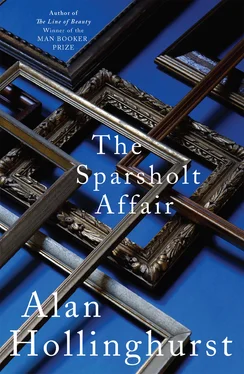Alan Hollinghurst - The Sparsholt Affair
Здесь есть возможность читать онлайн «Alan Hollinghurst - The Sparsholt Affair» весь текст электронной книги совершенно бесплатно (целиком полную версию без сокращений). В некоторых случаях можно слушать аудио, скачать через торрент в формате fb2 и присутствует краткое содержание. Год выпуска: 0101, Издательство: Pan Macmillan, Жанр: Старинная литература, на английском языке. Описание произведения, (предисловие) а так же отзывы посетителей доступны на портале библиотеки ЛибКат.
- Название:The Sparsholt Affair
- Автор:
- Издательство:Pan Macmillan
- Жанр:
- Год:0101
- ISBN:нет данных
- Рейтинг книги:5 / 5. Голосов: 1
-
Избранное:Добавить в избранное
- Отзывы:
-
Ваша оценка:
- 100
- 1
- 2
- 3
- 4
- 5
The Sparsholt Affair: краткое содержание, описание и аннотация
Предлагаем к чтению аннотацию, описание, краткое содержание или предисловие (зависит от того, что написал сам автор книги «The Sparsholt Affair»). Если вы не нашли необходимую информацию о книге — напишите в комментариях, мы постараемся отыскать её.
The Sparsholt Affair — читать онлайн бесплатно полную книгу (весь текст) целиком
Ниже представлен текст книги, разбитый по страницам. Система сохранения места последней прочитанной страницы, позволяет с удобством читать онлайн бесплатно книгу «The Sparsholt Affair», без необходимости каждый раз заново искать на чём Вы остановились. Поставьте закладку, и сможете в любой момент перейти на страницу, на которой закончили чтение.
Интервал:
Закладка:
‘That does sound a bit rash,’ I said, more tactfully. ‘He’s very young. Anyway, I’m not sure that undergrads are allowed to get married, are they? I’ve never heard of it.’
‘Of course I said to him, “What’s the hurry?” and he said, “Well, you never know what’s going to happen, these days, do you. I might be dead otherwise before I get the chance.” I said, “By that thinking, there are quite a lot of things you ought to do now, while you can!” ’
‘And what did he say to that?’
Evert gave a nauseated smile. ‘He said what he wanted most of all was to have a son.’
I had finished Victor Dax’s novel at last, and wondered what passages from it he would choose to read to the Club. It impressed me, though it wasn’t exactly enjoyable; my regard for it had its share of self-regard, at having got through it and grasped what it was doing. It was unshakeably serious, and I liked my prose to have at least a glimmer of humour. Dax’s nearest approaches to jokes were quotations from Erasmus and occasional mockery of the working classes. Still, I had seen the solemn praise of the book in the latest Horizon , and read the long TLS ‘middle’ which compared it favourably to the Dance of Shadows trilogy, books I’d devoured in the sixth form as the height of modernity and sophistication. If Dax wasn’t going off, I perhaps was going off him.
I thought I could talk to Peter Coyle about the novel and went over to the Ashmolean the next day. If I expected to find Sparsholt sprawled naked on a rostrum in front of him I was disappointed. Peter had just come out of a drawing class with Professor Schwabe, and was more than usually restless. He missed London, and the evacuation of the whole Slade School to Oxford had been a great frustration to him. Nor did he get on with Schwabe himself, who kept trying to suppress the strong vein of fantasy in Peter’s work. It was an inevitable clash: the Professor was a painstakingly old-fashioned craftsman, expert in topographical drawings and prints, while Peter was romantic, extravagant, at times rather silly, and a reckless taker of short cuts.
He signed out in the ledger by the door, and we went into the street. I was curious about Sparsholt, but wary of bringing the subject up; these black moods were short-lived but keen while they lasted. Besides, I was conscious by now of seeing the situation from Evert’s angle, and it was possible Peter himself attached little importance to it. In Beaumont Street an eternal Army convoy was rumbling past, the eight-second gap between lorries a subliminal rhythm of those years – Peter dashed across the road, though I, with my lifelong propensity to trip, or drop something, whenever physical speed was required, stood waiting for two minutes till the line and its busy wash of backed-up bicycles had passed. I found him in the Randolph, ordering tea.
He started talking about a play he’d been asked to design the sets for, and in a minute the annoyances of school were forgotten. It was called The Triumph of Time , an allegorical play of a kind I resisted, but which gave him exciting scope for some large-scale backdrops – I doubted if the Oxford Playhouse was really big enough for the visions he had of them. I was able in a while to say almost dismissively, ‘You might get Sparsholt as one of your devils, can’t you see him painted scarlet?’ and Peter then said that he’d had a brief note from him – it was in his pocket now.
‘Dear Mr Coyle,’ Sparsholt had written, ‘I was quite surprised to get your letter, and can’t think how you have heard of me! I do think it would be interesting to have one’s portrait painted, however I am extremely busy at present, and you may prefer to find other models for your work. Thursday evenings are possible for me, if not too late for you. Hoping to hear from you, D. D. Sparsholt.’ The letter was a diagram of divided feelings, written in a stiff schoolboy hand that yielded here and there to wide grown-up flourishes.
‘So he’s too busy,’ said Peter. I was surprised by my own alarm that he might be going to drop the whole thing.
‘Well, he has a lot on,’ I said, and I filled him in on Sparsholt’s various commitments – his rowing and his PT, and of course the long hours in the labs.
Peter shrugged, and peered round at the few other people taking tea beneath the dingy Gothic vault of the lounge. I filled up the pot from the scalding hot-water jug and gave it a stir. ‘I’ve been drawing a young gardener at Corpus,’ he said, a clear but mysterious emphasis on the word ‘drawing’.
‘Nude?’ I said.
‘I find it easier,’ Peter said, and gave a smile that seemed to count on my admiration and perhaps to take pleasure in shocking me a little. I saw that to him it was an advantage to be free of the traps of college life. In his digs at the far end of Walton Street he had no chance of meeting David Sparsholt in the bathroom. There was none of the deadliness of waiting and spying or the fateful flutter of a chance encounter in the quad. I said,
‘And you know he has his fiancée to take care of.’
Peter snuffled slightly, as if trusting this was a joke. ‘Sparsholt, you mean?’
‘Oh, yes,’ I said, with a shake of the head. ‘He told me all about it.’
He reflected for a moment. ‘It’s rather sweet,’ he said, ‘in its way. But it won’t last.’
‘They mean to get married quite soon,’ I said.
He glanced again at the letter, and then tucked it away in his big tweed jacket, the pocket thick with what looked like other letters. ‘I’ve got a pretty good hunch that she doesn’t understand his true nature.’
‘Well, you may be right,’ I said.
‘What’s her name, anyway?’
‘That I don’t know,’ I said, ‘but I’ve told him I’d like to meet her.’
‘Have you?’ said Peter, more distracted than resentful. The fact that I’d told a lie intrigued me and should perhaps have alarmed me. I’d conceived a blurred involuntary image of the fiancée, as one does of anyone spoken of but unknown. There was still everything to find out. Peter had the pride as well as the charm of a rake, and with it the rake’s ability to dismiss with contempt anyone who resisted him. I wasn’t sure now if I’d sharpened his interest in David, or unwittingly encouraged him to write him off.
4
Evert’s rooms were on the far side of College, and unlike mine looked outwards – not exactly at the world, but at the Meadow, with its grazing cows and misty distances. On the gravel walk below his window cadets were drilled and couples strolled, and up the long lime avenue beyond, the rowing eights of half the university would trail home from the river in the dusk. In those days the building he lived in was thought a Victorian eyesore; for me the stone stairs and Gothic windows stirred chilly memories of being at school. To put his mark on his rooms, Evert was already buying pictures, a colour print of a Whistler nocturne, a drawing of Windsor Castle, apparently on fire, by Peter Coyle, a little Sickert drawing and a few other things from home. Victor Dax was a collector, and had what Evert said were important paintings by Derain and Chagall. He had given Evert an etching of a large-bosomed nude by Anders Zorn, which drew odd chuckles from his scout. I felt myself it was a funny thing for a father to have given his son, but I saw there was a certain contempt for convention in much of Victor’s behaviour, and in this case perhaps a touch of wishful thinking.
‘Come and have a Camp,’ Evert said, as we jostled together on our way out of Hall a few days later. ‘I haven’t seen you for quite some time’ – with an odd smile: I don’t know if he thought I’d been seeing Sparsholt again. I said,
Читать дальшеИнтервал:
Закладка:
Похожие книги на «The Sparsholt Affair»
Представляем Вашему вниманию похожие книги на «The Sparsholt Affair» списком для выбора. Мы отобрали схожую по названию и смыслу литературу в надежде предоставить читателям больше вариантов отыскать новые, интересные, ещё непрочитанные произведения.
Обсуждение, отзывы о книге «The Sparsholt Affair» и просто собственные мнения читателей. Оставьте ваши комментарии, напишите, что Вы думаете о произведении, его смысле или главных героях. Укажите что конкретно понравилось, а что нет, и почему Вы так считаете.












